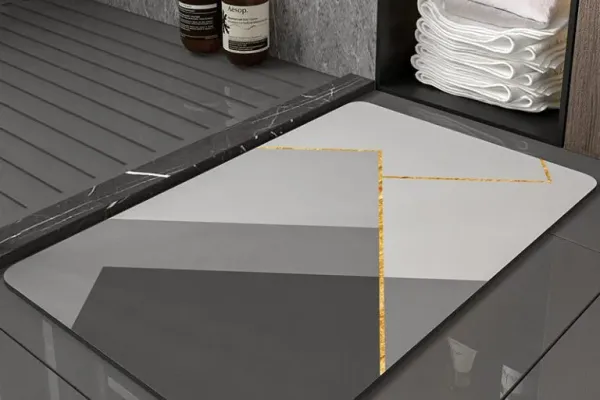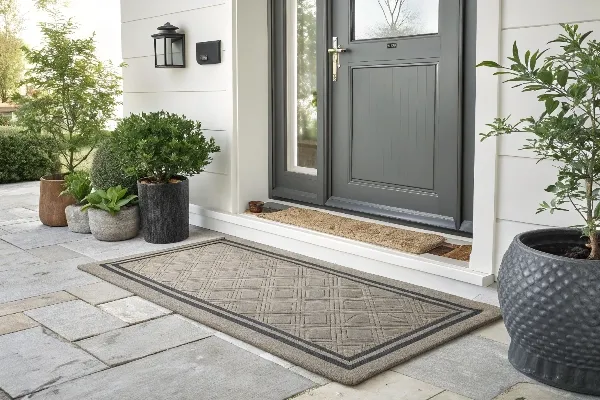Tired of crunchy surprises underfoot? Cat litter tracked through your house is a constant battle, turning clean floors into gritty pathways and adding endless sweeping to your chores. It’s frustrating! We, as manufacturers specializing in floor solutions, understand this common pet owner pain point and offer the perfect solution: a high-quality tapis de litière pour chat.
Le meilleur tapis de litière pour chat effectively pièges à déchets granules shaken off your cat’s paws as they exit the bac à litière. Look for tapis with specific textures or designs, like deep grooves, mesh, coils, or honeycomb patterns (honeycomb mats), designed to capture litter. Material (PVC, EVA foam, silicone), size relative to the bac à litière, ease of cleaning, and a non-slip, potentially waterproof mat backing are crucial factors. The meilleur tapis de litière balances efficiency with being comfortable for your cat maybe sensitive paws.
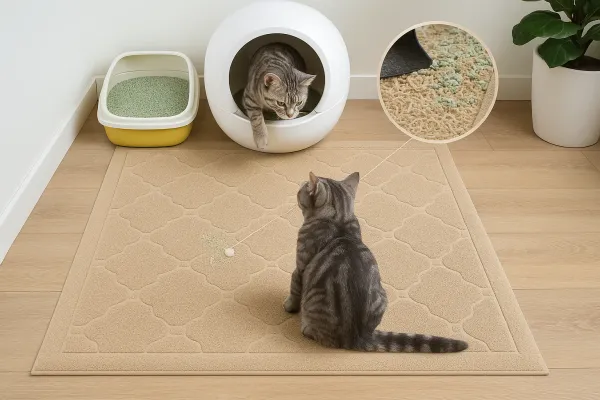
Why is Controlling Litter Scatter So Important for Cat Owners?
Living with cats brings immense joy, but the persistent issue of dispersion des déchets can be a significant downside. When Suivi des déchets goes unchecked, those tiny granules spread far beyond the immediate area around the litter box, embedding themselves in carpets, sticking to socks, and creating a generally unclean feeling throughout your home. It’s not just an aesthetic issue; scattered litter can contribute to dust and potential allergens, impacting household hygiene.
Furthermore, constant litter everywhere means constant cleaning. Cat owners often find themselves sweeping or vacuuming multiple times a day just to garder les déchets contained. This adds stress and takes away from the enjoyment of having a feline companion. For businesses like hotels or retailers selling home goods, maintaining cleanliness is paramount, and effective litter control solutions are highly sought after. As manufacturers, we see the demand for tapis that truly solve this problem, protecting floors and simplifying life for propriétaires de chats. A good tapis de litière pour chat is an investment in a cleaner, less stressful home environment.
Le droit tapis acts as the first line of defense, strategically placed to intercept litter from your cat’s paws before it can migrate further. It helps maintain designated clean zones and protects flooring surfaces, especially hardwood or laminate, from abrasive granulés de litière. Ultimately, controlling dispersion des déchets enhances the human-animal bond by removing a common source of frustration.
What Makes a Cat Litter Mat Effective at Trapping Litter?
The secret to an effective tapis de litière pour chat lies in its design and material, specifically engineered to piège à litière efficiently. The surface texture of the mat plays a critical role. Tapis featuring deep grooves, raised patterns, mesh structures, or coil loops create friction and provide spaces for particules de litière to fall into as the cat walks across them. These designs physically dislodge and capture litter from the paws.
Materials are equally important. PVC (chlorure de polyvinyle) is popular for its durability, water resistance, and ease of cleaning – you’ll find it in many coil or spaghetti-style tapis. EVA (ethylene-vinyl acetate) foam is often used in double-layer honeycomb mats; it’s lightweight, soft, and effective. Silicone tapis offer flexibility and a non-slip grip, while microfiber tapis can be soft and absorbent but may require more frequent washing. The goal is to find a tapis whose material and texture work together to piège à litière granules effectively without being uncomfortable for the cat.
As manufacturers, we experiment extensively with different weaves, depths, and materials to optimize trapping performance. For example, our Tapis de litière pour chat en PVC utilize a specific coil density designed to capture litter while remaining relatively easy to clean. The effectiveness ultimately depends on how well the le tapis est conçu to dislodge and contain those pesky granulés de litière right outside the bac à litière.
How Do Different Cat Litter Mat Designs Compare? (e.g., Honeycomb vs. Coil)
Lors de la sélection du best cat litter box mat, you’ll encounter several common designs, each with unique pros and cons. Two of the most popular are honeycomb (double-layer) tapis and coil (spaghetti) tapis. Understanding their differences helps in choosing the right tapis for your needs and your cat’s habits.
Honeycomb Mats:
-
Structure: Ces tapis typically feature two layers. The couche supérieure has relatively large holes in the top layer, often shaped like honeycombs. As the cat walks on it, litter falls through the top layer and is litter trapped on the solid bottom layer or bottom of the mat.
-
Avantages : Very effective at trapping much litter. Easy to empty – simply separate the layers and pour the collected loose litter back into the bac à litière or trash. Often made of soft EVA foam, which many cats find comfortable. The pièges à tapis litter out of sight.
-
Inconvénients : Can be bulkier. Urine accidents might get trapped between layers, requiring more thorough cleaning. Some cats might not like the feel of the larger holes.
Coil/Spaghetti Mats:
-
Structure: Ces tapis consist of a single layer of looped or coiled vinyl/PVC strands, creating a dense, textured surface. Think of our popular Tapis de litière pour chat en PVC.
-
Avantages : Good at scraping litière off paws due to the tangled texture. Generally durable and often feature non-slip backing. Easy to clean by shaking tapis extérieur, vacuuming, or rinsing. Available in various sizes and colors.
-
Inconvénients : Litter remains visible on the tapis surface until cleaned. Deeper cleaning might be needed occasionally to remove fine dust. Some cats might try to scratch or chew on the coils.
Ultimately, the meilleur tapis de litière pour chat design depends on priorities. If ease of emptying and hiding litière are key, honeycomb tapis fabriqués of EVA might be preferable. If durability, straightforward cleaning, and a textured scrape are desired, a PVC coil tapis is a strong contender. As manufacturers, we offer various designs, including custom options, to meet diverse market needs.
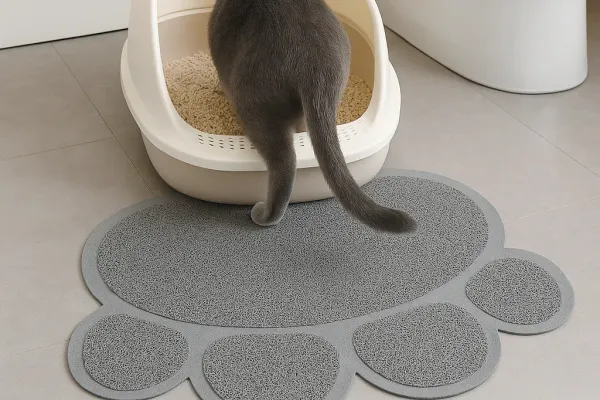
Are Gorilla Grip Cat Litter Mats a Top Pick?
Poignée Gorilla is a well-known brand in the household tapis market, and their tapis de litière pour chat are often considered a top pick by consumers. What makes them popular? Typically, Gorilla Grip cat litter mats focus on effective trapping capabilities combined with durability and user-friendly features. They often utilize specific textures or patterns designed to dislodge and hold onto litière efficacement.
Beaucoup Poignée Gorilla tapis, particularly the gorilla grip cat litter trapping mat styles, boast a tough construction intended to withstand scratching and regular use. A key feature often highlighted is their non-slip backing, which helps keep the tapis securely in place in front of the litter box, preventing it from sliding around on smooth floors. This stability is crucial for maximizing litière capture as the cat walks across it. The gorilla grip cat litter mat aims to provide a reliable solution for reducing Suivi des déchets.
While specific models vary, the Gorilla Grip mat reputation often centers on a balance of effective trapping and practicality. They aim to capture litter efficiently using textured surfaces, often made from durable materials like PVC or specialized rubber blends. When considering a gorilla grip cat litter tapis, look at the specific design (e.g., ribbed, woven, honeycomb-like), size options, and cleaning instructions to ensure it meets your requirements for managing your cat’s litter.
What About Options Like the Pieviev or IPrimio Cat Litter Trapper?
Beyond Gorilla Grip, other brands like Pieviev and IPrimio offer popular and effective tapis de litière pour chat solutions, particularly known for their récupérateur de litière pour chat designs. These often utilize the double-layer honeycomb system, which has gained significant traction among propriétaires de chats for its ability to piège à litière efficiently and make disposal cleaner.
Le Pieviev cat litter mat is frequently praised for its large honeycomb holes on the couche supérieure, which allow litter falls through easily onto the bottom layer. This design helps keep the surface relatively clean for the next use. They often come in various sizes, catering to different bac à litière dimensions and spaces. The material is typically a soft, cat-friendly EVA foam, which is also lightweight and relatively easy to handle for cleaning.
Similarly, the Iprimio cat litter trapper (and specifically, the iprimio cat litter trapper tapis) is another highly-rated honeycomb-style tapis. IPrimio often emphasizes features like a urine-repellent or waterproof mat layer to handle accidents and deeper channels or textures within the honeycomb structure to maximize piégeage des déchets. Some Litière pour chat iprimio models might have unique opening designs for easier pouring out of the trapped litière. When comparing these options, consider the hole size, overall tapis dimensions, material softness, ease of separating layers, and specific features like water resistance. Both Pieviev and IPrimio represent strong contenders in the market for best overall effective litière control using the cat litter trapper mat conception.
Does Mat Size Matter for Containing Litter Around the Litter Box?
Absolutely, size is a critical factor when choosing a tapis de litière pour chat. UN tapis that’s too small simply won’t provide enough surface area to effectively attraper les déchets lorsque votre chat sort de la bac à litière. Cats don’t always step neatly onto the center of the tapis; they might leap out, step off to the side, or take several steps before most of the loose litter is dislodged from their paws.
A larger tapis significantly increases the chances of trapping that escaping litière. Ideally, the tapis should extend generously around the litter box, particularly covering the main exit path in front of the litter box and potentially wrapping slightly next to the litter box sides if your cat tends to exit from different angles. For households with a large cat or cats that are particularly vigorous diggers and kickers, investing in a grande portée tapis is often essential to manage the resulting dispersion des déchets. You want to maximize the paw-contact area as the cat walks away from the bac à litière pour chat.
Consider the size of your bac à litière itself. The tapis should be substantially wider and longer than the box’s footprint. Measure the area around the litter box where you typically see the most litière accumulation and choose a tapis that covers this zone. Some manufacturers, including us, offer various sizes and even custom sizing options because we recognize that a one-size-fits-all approach doesn’t work for every home or bac à litière pour chat setup. Don’t underestimate the impact of adequate coverage – a generously sized tapis is often the key to significantly reducing Suivi des déchets.
How Do I Choose a Mat My Cat Will Actually Use?
Choosing the most technically effective tapis de litière pour chat is pointless if your cat refuses to step on it. Cats can be notoriously picky about textures and surfaces, so considering your feline friend’s preferences is crucial for success. The goal is to find a tapis that effectively pièges à déchets while also being acceptable, if not inviting, to your cat.
Observe your cat maybe preferences. Does your cat like soft blankets or tend to avoid certain rug textures? This can give you clues. Some cats dislike rough or spiky textures underpaw. If your cat is sensitive, look for tapis made from softer materials like EVA foam (honeycomb mats), smooth silicone (tapis en silicone), or even certain microfiber options. While these might require different cleaning methods, acceptance is key. If your cat likes to scratch, a very soft tapis might not be durable, so a balance might be needed – perhaps a moderately textured PVC coil tapis like some of our tapis pour animaux de compagnie could work.
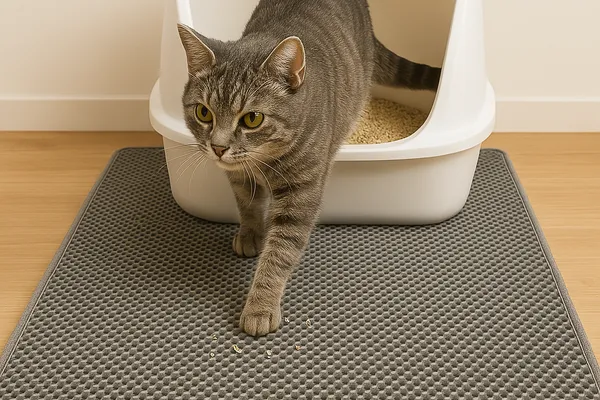
Introduce the new tapis gradually. Place it near the bac à litière first, not immediately forcing the cat to walk on it. You can use treats or toys to encourage positive association. Ensure the tapis is stable and doesn’t slide around, as instability can deter cats. The texture of the mat is paramount. If the first tapis choice is rejected, don’t give up – try a different material or design. Finding the right tapis ensures that your cat uses it consistently, making the piégeage des déchets effective in the long run. A tapis your cat avoids is just a floor decoration.
What are the Best Ways to Clean a Cat Litter Mat?
Garder votre tapis de litière pour chat clean is essential for hygiene and maintaining its effectiveness. The best cleaning method depends heavily on the mat’s material and design. Always check the manufacturer’s recommendations, but here are general guidelines for common types:
-
Honeycomb Mats (Double Layer): These are often the easiest for routine cleaning. Simply separate the couche supérieure from the bottom layer. Lift the tapis, allowing the litter trapped inside to funnel towards an opening or corner, and pour the loose litter into the trash or back into the bac à litière. For deeper cleaning (e.g., urine accidents), wipe down both layers with a pet-safe cleaner or mild soap and water, rinse thoroughly, and allow to air dry completely before reassembling. Many are made with waterproof mat matériels.
-
Coil/Spaghetti Mats (PVC): For daily maintenance, vigorously shake the tapis extérieur to dislodge much litter as possible. Vacuuming with a strong suction vacuum or shop vac is also very effective. For more thorough cleaning, rinse the tapis with water (a hose outside works well). Mild soap can be used for stubborn dirt or odors. Ensure it dries fully, as moisture trapped within the coils can lead to mildew. Our Tapis de litière pour chat en PVC are designed for this type of easy cleaning.
-
Silicone Mats: These are usually non-porous and easy to wipe down with a damp cloth and pet-safe cleaner. They can typically be rinsed under a faucet or hose as well. Their flexibility makes them easy to handle during cleaning.
-
Fabric/Microfiber Mats: These often require machine washing, similar to a rug. Check the care label. Use a gentle cycle and pet-safe detergent. Air drying is usually recommended to maintain the mat’s shape and integrity. These may take longer to dry. Consider having two to rotate while one is being washed.
Regular cleaning, regardless of the type, prevents odor buildup and ensures the tapis continues to piège à litière effectively. Knowing how to clean a cat litter mat properly extends its lifespan and keeps the area around the bac à litière pour chat more hygienic.
Beyond Specific Brands: What Key Features Define the Best Litter Mat?
While brands like Gorilla Grip, Pieviev, and IPrimio offer popular solutions, the truly meilleur tapis de litière isn’t just about a name – it’s about possessing the right combination of features. When evaluating any tapis de litière pour chat, focus on these core characteristics:
-
Effective Litter Trapping: This is paramount. Does the mat’s design (honeycomb, coil, grooves, texture) actively dislodge and capture litter from paws? The mat is designed to catch litter effectively. Look for depth and texture appropriate for the type of litière used.
-
Durabilité: Le tapis needs to withstand daily cat traffic, potential scratching (cat likes to scratch), and regular cleaning. Materials like high-quality PVC, robust EVA foam, or durable silicone tend to last longer. Tapis fabriqués from flimsy materials won’t hold up.
-
Non-Slip Backing: UN tapis that slides around is ineffective and potentially hazardous. A good grip keeps the tapis firmly in place mat under the litter box or wherever positioned.
-
Facilité de nettoyage : How simple is it to remove the trapped litière and clean the tapis itself? Consider shaking, vacuuming, rinsing (waterproof mat), or washing requirements based on your tolerance for maintenance. Clean a cat litter mat procedures should be straightforward.
-
Cat-Friendly Material: Le texture of the mat should be acceptable to your cat. Overly rough or uncomfortable surfaces might lead to avoidance. Softness combined with trapping ability is ideal.
-
Appropriate Size: Le tapis must be large enough to cover the exit area adequately, especially for large cat breeds or messy cats. Measure your space and choose accordingly.
-
Water/Urine Resistance: Accidents happen outside the litter box. UN waterproof mat or water-resistant material prevents liquids from soaking through to your floor, which is crucial for hygiene and floor protection. Options like the PetFusion ToughGrip Cat Litter Mat ou Litière pour chat Drymate Original often highlight this feature.
Focusing on these functional aspects will help you find the meilleur tapis de litière for your specific needs, regardless of the brand name. We, as manufacturers, prioritize these elements in our designs, including options like our tapis de litière pour chat écologique, ensuring quality and performance.
As Manufacturers, How Do We Ensure Quality and Customization?
As a dedicated manufacturing plant for tapis personnalisés, we understand that our target customers – importers, distributors, major retailers, e-commerce sellers, pet brands, and private label owners – demand more than just a basic product. They seek reliable, innovative, and customizable floor mat solutions, particularly for high-demand items like the tapis de litière pour chat. Our entire process is built around meeting these B2B needs with quality, functionality, and appealing design.
Quality Assurance: It starts with materials. We source high-grade, durable materials like PVC, EVA foam, and TPE, focusing on longevity and safety. We offer respectueux de l'environnement options for brands prioritizing sustainability. Our production lines incorporate rigorous quality control checks at multiple stages, from material inspection to final product testing, ensuring consistency and performance. We test for trapping efficiency, non-slip properties, durability against wear and tear, and ease of cleaning. This commitment ensures the tapis we produce effectively piège à litière and withstand real-world use, reducing Suivi des déchets de manière significative.
Customization & Partnership: We know one size rarely fits all in the global market. Our strength lies in customization. We work closely with clients to develop tapis tailored to their specific requirements:
-
Size & Shape: Custom dimensions to fit particular spaces or bac à litière dessins.
-
Color & Design: Wide range of colors and patterns, including proprietary designs or incorporating client branding.
-
Sélection des matériaux : Offering choices based on price point, desired features (e.g., extra softness, enhanced waterproofing), and eco-credentials.
-
Packaging & Branding: Custom packaging solutions for retail readiness, supporting private label brands in creating a unique market presence. Our tapis de litière pour animaux de compagnie can be fully customized.
By combining manufacturing expertise with a flexible, client-focused approach, we empower businesses to offer superior tapis de litière pour chat (and other floor tapis solutions like paillassons ou tapis de cuisine) that meet consumer demands for cleanliness, convenience, and style. We aim to be the reliable production partner behind successful home furnishing and pet product lines worldwide.
Frequently Asked Questions (FAQs)
À quelle fréquence dois-je remplacer mon tapis de litière pour chat ?
La durée de vie d'un tapis de litière pour chat depends on its material, quality, your cat’s habits (scratching, accidents), and how well it’s maintained. High-quality PVC or EVA foam tapis can last several years. Replace the tapis if it becomes torn, cracked, permanently stained or odorous despite cleaning, or if its trapping ability significantly diminishes.
Can a cat litter mat completely stop litter tracking?
While the meilleur tapis de litière pour chat can drastically reduce the amount of litter tracked through your home (often by 80-90% or more), completely eliminating every single granule is challenging. Factors like litière type, cat fur length, and how vigorously your cat exits le bac à litière play a role. However, a good tapis makes a huge difference and contains the vast majority of scattered litter.
Are expensive cat litter mats always better?
Not necessarily. Price can reflect material quality, size, brand name recognition, or specific features (like advanced waterproof mat layers). However, a moderately priced tapis with an effective design (good trapping texture, non-slip backing, decent size) can perform just as well or better than a very expensive one. Focus on the key features relevant to your needs rather than just the price tag. Look for mats that balance cost and function.
What if my cat refuses to walk on the litter mat?
Cat acceptance is key. If your cat avoids le tapis, try:
-
Choisir un tapis with a softer texture of the mat.
-
Gradually introducing it near the bac à litière.
-
Using positive reinforcement (treats) near the tapis.
-
Ensuring the tapis is stable and doesn’t slide.
-
Trying a different material or design if the first fails. Some cats simply have strong preferences.
Are rubber-backed mats safe for all floor types?
Some rubber backings can potentially discolor or react with certain floor finishes over time, particularly vinyl or sealed hardwood, especially if moisture gets trapped underneath. Look for tapis specifically labeled as safe for your floor type, or consider tapis with PVC, TPE, or felt backings known to be less reactive. Regularly lifting and cleaning under the tapis is also advisable.
Where is the best place to put the cat litter mat?
Place the tapis directly abutting the entrance/exit of the bac à litière. Ensure it covers the primary path your cat takes when leaving the box. For corner placements or cats that jump out erratically, a larger tapis or multiple tapis might be needed to cover the main landing zones around the litter box. The goal is to force the cat to walk across a sufficient area of the tapis immediately after utiliser la litière.
Key Takeaways for Choosing the Best Cat Litter Mat
-
Function First: The primary job is to piège à litière; look for designs (honeycomb, coil, textured) and materials that excel at this.
-
La taille compte : Bigger is often better. Ensure the tapis covers the main exit area from the bac à litière adequately.
-
Cat Comfort: Choisissez un texture of the mat your cat will tolerate or even prefer. Softness can be key for sensitive paws.
-
Nettoyage facile : Consider how you’ll clean the tapis (shake, vacuum, rinse, wash) and pick one that suits your routine. A waterproof mat layer helps with accidents.
-
Stability is Crucial: A non-slip backing prevents the tapis from sliding, ensuring it stays where it needs to be to attraper les déchets.
-
Durability Pays Off: Invest in a well-made tapis from quality materials (PVC, EVA, silicone) for longer-lasting performance.
-
Manufacturer Partnership (For Businesses): Look for suppliers offering quality, customization, and reliability for your brand’s needs.
Trouver le bon tapis de litière pour chat significantly reduces household chores and stress, creating a cleaner environment for both you and your feline friend. As manufacturers, we are committed to providing effective and customizable solutions to stop the spread of litter.



